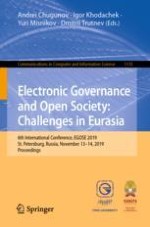2020 | OriginalPaper | Chapter
Existing and Promising Theoretical Approaches to Understanding ICTs Contribution to Anti-corruption Efforts
A Literature Review
Authors : Cecilia Strand, Mathias Hatakka
Published in: Electronic Governance and Open Society: Challenges in Eurasia
Publisher: Springer International Publishing
Activate our intelligent search to find suitable subject content or patents.
Select sections of text to find matching patents with Artificial Intelligence. powered by
Select sections of text to find additional relevant content using AI-assisted search. powered by
